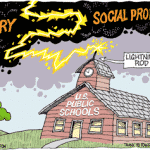This is a cross-post from EdGator.com.
[fusion_builder_container hundred_percent=”yes” overflow=”visible”][fusion_builder_row][fusion_builder_column type=”1_1″ background_position=”left top” background_color=”” border_size=”” border_color=”” border_style=”solid” spacing=”yes” background_image=”” background_repeat=”no-repeat” padding=”” margin_top=”0px” margin_bottom=”0px” class=”” id=”” animation_type=”” animation_speed=”0.3″ animation_direction=”left” hide_on_mobile=”no” center_content=”no” min_height=”none”]
I got involved in the scrap over education two years ago when I wrote an epistle known as “The Alamo Letter” to my state legislators. The impetus for the letter came from two body blows schools in Texas had taken at the time. First, the state had announced it would be making massive cuts–originally announced at $10 billion, later shaved to $5.4 billion–in the amount of funding allocated to schools. Second, state legislators made it clear that there would be no cutting the $500 million budget set aside to pay Pearson for a new, more rigorous standardized testing program with far more tests and far more days wasted on testing. Add these two issues to the fact that Texas educators had labored for years under increasingly burdensome testing and accountability requirements with no relief in sight, and to the fact that the state was actively funding some schools at double and triple the per-pupil funding level at which it funded others, seemingly at random, and I decided I didn’t much care what the consequences were: I had to say something.
A lot has changed since 2010. Before I ever said one word–long before I was a superintendent–a group of well-regarded superintendents from some of Texas’s most high-performing schools had produced a Visioning Document that called for really smart changes to the Texas testing and accountability system. This wasn’t a mere rollback of testing. It was a smart redesign. Based upon this document, superintendents and the state superintendents’ association began to push for legislation creating a pilot program wherein certain schools could try innovative approaches to accountability. The law creating this program–the Texas High-Performing Schools Coalition bill–passed in 2010.
Another thing happened in 2010: a school board member from a very successful suburban district got wind of looming cuts coming from Austin and decided to be proactive. His name was Bobby Rigues, and he began to speak out and write. He started a website and a movement–Make Education a Priority–that ultimately saw hundreds of Texas school boards adopt a resolution directly calling on state legislators to protect school funding. This idea–a resolution calling for action–would be revisited again with great effect.
Save Texas Schools came on the scene some time before my Alamo letter hit Valerie Strauss’s blog at the Washington Post website. But they really hit the big-time after their first statewide rally was held on the steps of the state courthouse during the tense days of 2010 and drew 13,000 marching public schools supporters. Last year’s Save Texas Schools rally, held when Texas’s biannually-meeting legislators weren’t in session, drew something more like 5,000.
After Texas legislators finished their bloody business and went through with the funding cuts and the testing expansion in the face of fierce opposition, many more pro-public ed groups popped up. Make Education a Priority and Save Texas Schools would be joined by Texas Kids Can’t Wait, Texas Parents Opt-out of State Tests, Speak Up for Public Schools, and a group that would be renamed “Mothers Against Drunk Testing” by the state’s education commissioner, Texans Advocating for Meaningful Student Assessment (TAMSA). These groups joined long-standing supporters like Friends of Texas Public Schools and Raise Your Hand Texas on the battlelines defending the assailed constitutional guarantee of a system of free public schools for Texas children.
After the 2010 session was over and the dust settled, four different groups of schools filed suit against the state. They were joined by an “efficiency intervenor” group who argued that money doesn’t matter and a charter school group arguing for more charter funding and the lifting of the charter school cap.
The previous lawsuit against the state some years earlier–the sixth of its kind–had ended with the state Supreme Court talking about a “predicted drift” toward unconstitutionality if the state continued to underfund and overexpect. This judicial language apparently didn’t frighten the legislative and executive branches very much; it was full speed ahead on the less resources, higher expectations steamer.
As the lawsuit took shape, the Texas education commissioner took to the stage at the 2011 superintendents’ association’s Midwinter Conference. This was an annual rite. I looked at a friend sitting next to me. “What do you think he’ll say?” I asked. The anger in the room was palpable. “If it’s like last year, nothing good,” he said.
He was wrong. Robert Scott stood in front of the room and talked about the testing juggernaut the way we superintendents always talked about it. Testing had taken over; it had grown too big, too all-important. It was crowding out learning. It was hurting children. He looked forward to “reeling it in.”
I was stunned. It wasn’t just us teachers and principals and superintendents and parents shouting into the wind now. People near the levers of control were hearing–and repeating–our refrains. Scott would resign his post within a month or two.
After Robert Scott spoke out, one of the Texas test-ophiles wrote an ugly letter calling him a “cheerleader for mediocrity,” or some such. (Because, apparently, there is no legitimate way to support education other than pushing for millions more to be shipped to Pearson.) In response to this man’s letter, the superintendents who had been diligently studying and redesigning accountability took action. They developed a resolution calling on the state to re-examine the testing system. This was the first time Bill Hammond–Texas’s galloping privatizer of roads and schools–shot himself in the foot. It wouldn’t be the last. The resolution stated that testing was “strangling” a true education; it gathered the support of over 800 (out of 1200) Texas school boards. It also spawned a national resolution and one variant or another of it was adopted coast to coast.
Soon, the Texas Workforce Commissioner was speaking out on the effects of overtesting and Texas’s silly “all students are going to college” approach on the makeup of the Texas workforce. Our plumbers and electricians were aging, and there weren’t enough young men and women entering the skilled trades to take their places. They were all sitting in either remedial test-prep classes or AP classes, and no one was learning work-related skills. This sparked some interesting back-and-forth op-ed wars between this Commissioner–Tom Pauken–and the staunchest Texas defenders of the testing status quo.
The no-holds-barred straight-dope information campaign about testing has had a huge effect. The test lobby shot themselves in the foot by repeatedly overreaching. When 9th grade moms learned that the new STAAR test would count as fifteen percent of their children’s grades–would, in other words, impact GPAs and college entrance–they formed TAMSA and became pit bulls. Members of the House of Representatives couldn’t agree with these mad moms fast enough.
Speaking of the mad moms, Bill Hammond shot himself in the foot a second time when, after the moms had issued a press release decrying the effects of overtesting on their children, he had the temerity to imply that these women were only worrying their pretty little heads because superintendents were scaring them with scary stories about scary tests. These women weren’t, apparently in someone’s opinion, smart enough to figure these things out on their own. The moms didn’t appreciate that, as they made pretty clear in a subsequent op-ed. That was the second time Hammond shot himself in the foot. It wouldn’t be the last. Later, Hammond and his privatizing allies gave a press conference in which they threw down a gauntlet: if we didn’t all fall in line and go along with the business lobby’s STAAR system as is–no changes whatsoever–his group would oppose all further school funding. The threat not only rubbed the moms the wrong way, but it also fell on deaf ears among school officials. We had just taken a $5.4 billion walloping the previous session. If that was the kind of help Hammond was offering, no thanks. It was pretty clear the test-ophiles weren’t pushing real hard for more education funding regardless.
And so there are now tangible victories. The 2013 Texas House of Representatives adopted an initial budget with $0 set aside for Pearson. Last session, the House unanimously approved a two-year moratorium on testing.
Suddenly, this isn’t reformers vs. teachers. This is quite clearly business interests vs. the people of the state of Texas.
But, while the House responds to calls from voters, the Texas Senate mostly responds to calls from lobbyists and “the base.” The Senate is trying to protect as much of Pearson’s honey hole as they can. They are–it appears to me–trying to make cosmetic tweaks to the program (like getting rid of the fifteen percent rule, and reducing the number of tests that count for children without reducing the number of tests being given) without weakening Pearson’s bottom line. They are also pushing adamantly for a voucher program (which the language police have insisted everyone call “school choice” or “happy shiny opportunity blessings”), pushing hard not because the program is good for kids but rather, in the literal words of its staunchest supporter, merely because “the base” wants it. It’s about doing what it takes to get re-elected, not doing right by the state of Texas or the children of Texans.
What “the base” wants is more important than what “the state” or “the kids” need. This is the ugliness you get when politics meets education. Politics trumps leadership. The politicians’ welfare outweighs the greater good. Politics outshines the state constitution in the polluted Senate’s constellation, though this isn’t apparently true in the House.
The Senate wants to keep as much of the testing as possible, for some reason. I suspect it’s what the business lobby has told them to do. It wants school choice. It wants to lift the cap on charters. It wants to actively preserve inequitable funding. The great thing about inequity is that it results in lower property tax rates in high-value areas. The downside is poor kids in poor schools get a second-rate education; but on the plus side, businesses get what they affectionately refer to as “tax havens.”
The schools won the recent Texas lawsuit decisively. The charter cap remains in place. Competition, the judge ruled, is a matter for the legislature to decide. The system was declared unconstitutionally inadequate, unconstitutionally inequitable, and just kind of all around sorry. But that was just round one. The next hearing will most likely be at the Supreme Court, whose justices were brought to you by the same voters who gave us Rick Perry.
So there are clearly challenges ahead. Public education in the state of Texas is under grave threat as never before. Our leaders don’t see public education as the public good in the same way that Mirabeau B. Lamar (former President of the Republic of Texas) saw it when he said, “The educated mind is the guardian genius of democracy.” Lamar fought to establish–at great public cost–a statewide system of free public schools using land, the only wealth the Republic had at the time, to make it happen. Before him, the Texans who signed the Declaration of Independence clearly stated that one reason for their rebellion was Mexico’s failure to establish a system of free public schools for Texans’ children. And the drafters of our state constitution said very clearly in Article 7 that the establishment of and provision for a system of free public schools would be the legislature’s undying obligation.
Sadly, our leaders are finding it hard to keep the promises made back when leaders were brave and served the public good ahead of the narrow interests of lobbyists who fund their campaigns.
We’ll see what happens in Austin this legislative session. One thing is certain though: we’ll be on the steps of the statehouse on Saturday, February 23. Diane Ravitch will be speaking. Oh, and one other person will be speaking to the crowd there: former Texas education commissioner Robert Scott.
The new education commissioner in Texas has asked superintendents to “tap the brakes” on our agitating. With momentum finally swinging in the proper direction–empowered moms and vocal school officials are finally taking back the public spaces and seizing the microphones from a bullying business lobby that wants efficiency and low taxes more than it wants well-rounded children and a brighter Texas tomorrow–I don’t think tapping the brakes is the right prescription.
At any rate, I don’t believe the moms of TAMSA or the activists in the other groups are going to tap their brakes any time soon. In fact, if I had to guess, I’d say they’re about to press the pedal to the metal when the Lege really gets fired up and starts diverting public funds to private schools. But that’s just a guess.
If you enjoyed reading this article by John Kuhn, don’t forget to register for our annual conference where he will be the Keynote Speaker!
[/fusion_builder_column][/fusion_builder_row][/fusion_builder_container]





Dear Mr. Kuhn,
Please publish this article in the New YOrk Times…Please.
I wrote to New York TImes to tell them to contact you.
Your article says it all so well. Thank you so, so much.
I have been teaching 28 years and I love it…but no one got the whole picture better than you.
Be good to yourself.
Theresas LaSalle
http://theeducatorsroom.com/2012/09/the-exhaustion-of-the-american-teacher/